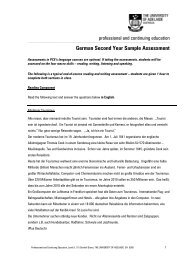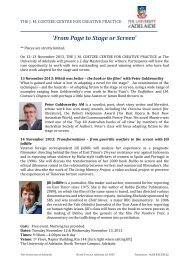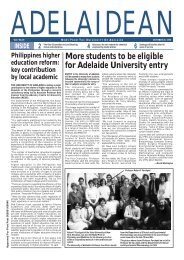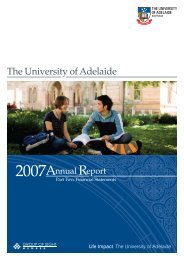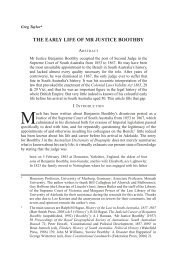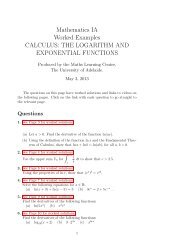Unbridling the Tongues of Women - The University of Adelaide
Unbridling the Tongues of Women - The University of Adelaide
Unbridling the Tongues of Women - The University of Adelaide
Create successful ePaper yourself
Turn your PDF publications into a flip-book with our unique Google optimized e-Paper software.
<strong>Unbridling</strong> <strong>the</strong> tongues <strong>of</strong> women<br />
mour. It was like that <strong>of</strong> Bret Harte’s version <strong>of</strong> Aesop’s Fables, which she gave to a<br />
friend for Christmas: 52 it had an edge, albeit a fairly blunt one. One <strong>of</strong> her favourite<br />
jokes was against herself, and she told it <strong>of</strong>ten. She arrived at a meeting to find that<br />
she had not been notified <strong>of</strong> several earlier meetings. She complained that she ‘did<br />
not want to be merely an ornamental member’ <strong>of</strong> that Board. Its chairman replied,<br />
‘Oh, Miss Spence, no one would ever accuse you <strong>of</strong> being that.’ She was laughing<br />
before he realized what he had said. As she left, she encountered <strong>the</strong> chairman’s business<br />
partner and, chuckling, told him <strong>of</strong> <strong>the</strong> faux pas. ‘Looking at her very gravely,<br />
he said at <strong>the</strong> end <strong>of</strong> <strong>the</strong> recital, “Well, Miss Spence, I am surprised. I really thought<br />
Charlie had more tact.” 53<br />
Her humour, her deep concern and generosity, her courage, and her formidable<br />
energy, were <strong>the</strong> qualities which made her impact so strong. Even people who found<br />
her a nuisance admired her: C. C. Kingston, whom she regarded as spineless and<br />
whom she badgered with telegrams during <strong>the</strong> 1895 Premiers’ Conference in Tasmania,<br />
treated her with goodhumoured courtesy and appointed her a member <strong>of</strong><br />
<strong>the</strong> government’s Destitute Board. 54 At one meeting <strong>of</strong> <strong>the</strong> board, its members were<br />
discussing how to punish some <strong>of</strong> <strong>the</strong> inhabitants <strong>of</strong> <strong>the</strong> Destitute Asylum. <strong>The</strong>y had<br />
been allowed out to witness a public function and had returned very much <strong>the</strong> worse<br />
for <strong>the</strong> hospitality <strong>the</strong>y had met with on <strong>the</strong>ir peregrinations. ‘Miss Spence stood<br />
up for <strong>the</strong>m stoutly. “Poor old things! What harm did it do once in a way!” ’ 55 Such<br />
qualities won her many friends, though – partly because she was so single-minded<br />
about her work – few very close ones.<br />
She had, her autobiography suggests, a particularly warm and supportive relationship<br />
with her mo<strong>the</strong>r. She recorded her mo<strong>the</strong>r’s pleasure in her earnings as a<br />
governess, her mo<strong>the</strong>r’s acceptance <strong>of</strong> <strong>the</strong> parting <strong>of</strong> <strong>the</strong>ir paths over religion, and <strong>of</strong>fered<br />
tribute to her mo<strong>the</strong>r’s sound judgment, accurate observation and kind heart.<br />
As <strong>the</strong> unmarried daughter who remained at home to look after her mo<strong>the</strong>r, Ca<strong>the</strong>rine<br />
participated in <strong>the</strong> realisation <strong>of</strong> Helen Brodie’s 40-year-old dream – to design<br />
<strong>the</strong> house that she would live in – not in Scotland, but in Trinity Street, College<br />
Town in <strong>Adelaide</strong>. A substantial house <strong>of</strong> about 12 rooms with huge windows looking<br />
out onto <strong>the</strong> lawns, and trees, it was probably considered comfortable but unpretentious<br />
when it was built. And that house, to which <strong>the</strong>y moved in 1870, included<br />
a little study in which Spence could work, delighting in being with her books and<br />
pigeon holes with her ‘dear old mo<strong>the</strong>r sitting with her knitting on her rocking chair<br />
at <strong>the</strong> low window’. She treasured her mo<strong>the</strong>r’s memory <strong>of</strong> <strong>the</strong> social changes she had<br />
16




